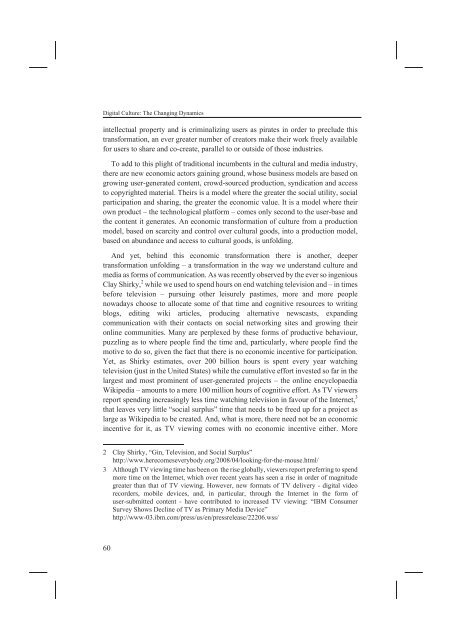D:\Documents and Settings\Ana\My Documents\Biserka-knjiga ...
D:\Documents and Settings\Ana\My Documents\Biserka-knjiga ...
D:\Documents and Settings\Ana\My Documents\Biserka-knjiga ...
Create successful ePaper yourself
Turn your PDF publications into a flip-book with our unique Google optimized e-Paper software.
Digital Culture: The Changing Dynamics<br />
intellectual property <strong>and</strong> is criminalizing users as pirates in order to preclude this<br />
transformation, an ever greater number of creators make their work freely available<br />
for users to share <strong>and</strong> co-create, parallel to or outside of those industries.<br />
To add to this plight of traditional incumbents in the cultural <strong>and</strong> media industry,<br />
there are new economic actors gaining ground, whose business models are based on<br />
growing user-generated content, crowd-sourced production, syndication <strong>and</strong> access<br />
to copyrighted material. Theirs is a model where the greater the social utility, social<br />
participation <strong>and</strong> sharing, the greater the economic value. It is a model where their<br />
own product – the technological platform – comes only second to the user-base <strong>and</strong><br />
the content it generates. An economic transformation of culture from a production<br />
model, based on scarcity <strong>and</strong> control over cultural goods, into a production model,<br />
based on abundance <strong>and</strong> access to cultural goods, is unfolding.<br />
And yet, behind this economic transformation there is another, deeper<br />
transformation unfolding – a transformation in the way we underst<strong>and</strong> culture <strong>and</strong><br />
media as forms of communication. As was recently observed by the ever so ingenious<br />
Clay Shirky, 2 while we used to spend hours on end watching television <strong>and</strong> – in times<br />
before television – pursuing other leisurely pastimes, more <strong>and</strong> more people<br />
nowadays choose to allocate some of that time <strong>and</strong> cognitive resources to writing<br />
blogs, editing wiki articles, producing alternative newscasts, exp<strong>and</strong>ing<br />
communication with their contacts on social networking sites <strong>and</strong> growing their<br />
online communities. Many are perplexed by these forms of productive behaviour,<br />
puzzling as to where people find the time <strong>and</strong>, particularly, where people find the<br />
motive to do so, given the fact that there is no economic incentive for participation.<br />
Yet, as Shirky estimates, over 200 billion hours is spent every year watching<br />
television (just in the United States) while the cumulative effort invested so far in the<br />
largest <strong>and</strong> most prominent of user-generated projects – the online encyclopaedia<br />
Wikipedia – amounts to a mere 100 million hours of cognitive effort. As TV viewers<br />
report spending increasingly less time watching television in favour of the Internet, 3<br />
that leaves very little “social surplus” time that needs to be freed up for a project as<br />
large as Wikipedia to be created. And, what is more, there need not be an economic<br />
incentive for it, as TV viewing comes with no economic incentive either. More<br />
2 Clay Shirky, “Gin, Television, <strong>and</strong> Social Surplus”<br />
http://www.herecomeseverybody.org/2008/04/looking-for-the-mouse.html/<br />
3 Although TV viewing time has been on the rise globally, viewers report preferring to spend<br />
more time on the Internet, which over recent years has seen a rise in order of magnitude<br />
greater than that of TV viewing. However, new formats of TV delivery - digital video<br />
recorders, mobile devices, <strong>and</strong>, in particular, through the Internet in the form of<br />
user-submitted content - have contributed to increased TV viewing: “IBM Consumer<br />
Survey Shows Decline of TV as Primary Media Device”<br />
http://www-03.ibm.com/press/us/en/pressrelease/22206.wss/<br />
60



